|
|
|
Sort Order |
|
|
|
Items / Page
|
|
|
|
|
|
|
| Srl | Item |
| 1 |
ID:
118642
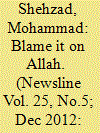

|
|
|
| 2 |
ID:
164150
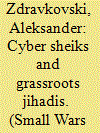

|
|
|
|
|
| Summary/Abstract |
What was the scope of the Bosnian jihadi participation in the war in Syria? Did the Bosnian volunteers tend to join one particular faction? Why did the Bosnian youngsters decide to join the holy war in the Levant? Was this an organized and hierarchical process or was this a grassroots movement? Last, were all the Salafis in Bosnia supportive of this dynamic or did this process cause internal frictions? These are some of the questions that this research will try to answer.
|
|
|
|
|
|
|
|
|
|
|
|
|
|
|
|
| 3 |
ID:
139996
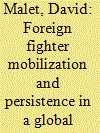

|
|
|
|
|
| Summary/Abstract |
Although foreign fighting is hardly new, scholarly research on the phenomenon is only a decade old. Since 2005, there has also been a dramatic rise in the number of transnational insurgents fighting in the Middle East, and they appear to have become the face of the jihad movement. However, of the dozens of foreign fighter contingents around the world in recent decades, only about half have been Islamists. In this article, I contend that the difference between the other contemporary and historical foreign fighter groups and the jihadis is not one of mobilization or effectiveness, but of persistence. Most other foreign fighters demobilized at the end of their conflicts and reintegrated. I argue that the primary factor that accounts for the persistence of the jihadis was the policies of their home and host states that prevented reintegration and created cohorts of stateless, and now professionalized, actors who perpetuate in weakly-governed conflict zones. In presenting this argument, I first attempt to establish a common working definition of foreign fighter based on the first decade of discourse in this emerging field of study, and present a comparative examination of the largest recorded foreign fighter mobilizations.
|
|
|
|
|
|
|
|
|
|
|
|
|
|
|
|
| 4 |
ID:
115253
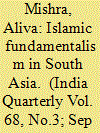

|
|
|
|
|
| Publication |
2012.
|
| Summary/Abstract |
Islamic fundamentalism is a multifarious movement with diverse manifestations, components, and contextual historical and societal conditions. While the radical Islamists, for instance, seek to impose change from above through holy wars, others pursue a bottom-up approach to bring about the re-Islamisation of the society through extensive networks of social activity. Regardless of their particularistic properties, all Islamist groups, however, share a common goal of establishing an Islamic order (nizam Islami) for the actualisation of Muslim life. The fundamentalists may not have registered considerable success in electoral terms, but they continue to dominate political discourse because their message is capable of attracting a broad spectrum of society. On the basis of a broad understanding of Islamic fundamentalism as a religio-political movement, this article attempts a comparative study of the phenomenon in Pakistan and Bangladesh, two leading Muslim states of South Asia. By examining the historical and social context, internal political developments including the role of state in promoting religious agenda and the varying impact of extraneous factors, the article argues that while Islamic fundamentalism in Bangladesh is containable, accomplishing it in Pakistan will be difficult because of the state appropriation of Islam in political discourse guaranteeing the movement's staying power.
|
|
|
|
|
|
|
|
|
|
|
|
|
|
|
|
| 5 |
ID:
167505
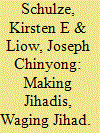

|
|
|
|
|
| Summary/Abstract |
This article examines the ISIS phenomenon in Indonesia and Malaysia. It aims to explain how, where, and why the transnational and local intersect as well as the role of religion, particularly in the ideological narratives and recruitment strategies of local jihadi groups. At the heart of this analysis is the question to what extent Indonesians and Malaysians were lured into joining ISIS as a result of its "universal" ideology and global recruitment strategy or whether they were instead propelled by local Indonesian and Malaysian dynamics into Syria and into "importing" and "indigenising" ISIS to advance their own agendas. The article argues that the potency and appeal of the extremist narrative of ISIS derives from how it animates and feeds off prevailing debates within Indonesia and Malaysia. These debates revolve around issues such as the nature of Muslim identity and what it means to be a "good Muslim", the place of Islamic law in society, relations within the ummah as well as with non-Muslims, and Islamic eschatology. While there is clearly a transnational dimension, the motivations for Southeast Asians to sympathize with or join the Syrian jihad and their engagement with ISIS are ultimately the product of local Indonesian and Malaysian dynamics rather than the "lure" of ISIS per se. This article thus contributes to the broader scholarly debate on how "global" the global jihad actually is and the phenomenon of "glocalisation".
|
|
|
|
|
|
|
|
|
|
|
|
|
|
|
|
|
|
|
|
|